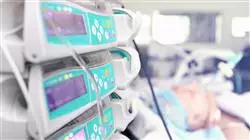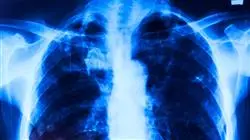University certificate
The world's largest faculty of medicine”
Introduction to the Program
The new scenarios in intensive care medicine push us to propose new training programs that meet the real needs of experienced professionals, so that they can incorporate advances in clinical practice in the face of severe neurological pathologies"

Neurological pathology represents a large part of the activity in an Intensive Care Unit but, usually, the critical situation of the patient prevents the systematic examination required in the outpatient, being the objective of the intensivist physician to establish the severity of the patient, locate the injured encephalic area and make urgent diagnostic or therapeutic decisions.
On the other hand, the innumerable variables that can influence severe traumatic disease during its evolution complicate the management of this disease and require multidisciplinary assessment and treatment, thus requiring the presence of a specialist in Intensive Care Medicine as a fundamental part of the severe trauma care team and its subsequent care in the critical care unit.
This Postgraduate diploma in Current Management of Neurology and Severe Trauma in Intensive Care Medicine is oriented to update the knowledge of the specialist physician who develops his clinical practice in the Intensive Care Unit.
Scientific evidence increases the quality of medical care. Staying up-to-date is key to providing better care for patients in life-threatening emergencies due to major trauma in the intensive care unit"
The Postgraduate diploma in Current Management of Neurology and Severe Trauma in Intensive Care Medicine contains the most complete and updated scientific program on the market. The most important features of the program include:
- Contains Clinical cases presented by experts. The graphic, schematic, and eminently practical contents with which they are created provide scientific and practical information on the disciplines that are essential for professional practice
- Diagnostic and therapeutic innovations in treating patients with neurological problems
- Presentation of practical workshops on procedures, diagnostic and therapeutic techniques in Life Support
- Video lessons on differentpathologies and how to approach them
- Algorithm-based interactive learning system for decision-making in the presented clinical situations
- Theoretical lessons, questions to the expert, debate forums on controversial topics, and individual reflection assignments
- Content that is accessible from any fixed or portable device with an Internet connection
This Postgraduate diploma may be the best investment you can make in the selection of a refresher program for two reasons: in addition to updating your knowledge in the care of patients with severe trauma in the intensive care unit, you will obtain a Postgraduate diploma from TECH Global University"
Its teaching staff includes leading professionals in intensive medicine, who contribute their work experience to this training, in addition to other specialists belonging to prestigious scientific societies.
The multimedia content developed with the latest educational technology will provide the professional with situated and contextual learning, i.e., a simulated environment that will provide immersive training program to train in real situations.
This program is designed around Problem Based Learning, whereby the physician must try to solve the different professional practice situations that arise during the course. For this reason, you will be assisted by an innovative, interactive video system created by renowned and experienced experts in Intensive Care Medicine and with extensive teaching experience.
Increase your decision-making confidence by updating your knowledge with this Postgraduate diploma"

Don't miss the opportunity to update your knowledge in the care of critically ill patients in the intensive care unit to increase the quality of your patient care"
Why study at TECH?
TECH is the world’s largest online university. With an impressive catalog of more than 14,000 university programs available in 11 languages, it is positioned as a leader in employability, with a 99% job placement rate. In addition, it relies on an enormous faculty of more than 6,000 professors of the highest international renown.

Study at the world's largest online university and guarantee your professional success. The future starts at TECH”
The world’s best online university according to FORBES
The prestigious Forbes magazine, specialized in business and finance, has highlighted TECH as “the world's best online university” This is what they have recently stated in an article in their digital edition in which they echo the success story of this institution, “thanks to the academic offer it provides, the selection of its teaching staff, and an innovative learning method aimed at educating the professionals of the future”
A revolutionary study method, a cutting-edge faculty and a practical focus: the key to TECH's success.
The most complete study plans on the university scene
TECH offers the most complete study plans on the university scene, with syllabuses that cover fundamental concepts and, at the same time, the main scientific advances in their specific scientific areas. In addition, these programs are continuously being updated to guarantee students the academic vanguard and the most in-demand professional skills. In this way, the university's qualifications provide its graduates with a significant advantage to propel their careers to success.
TECH offers the most comprehensive and intensive study plans on the current university scene.
A world-class teaching staff
TECH's teaching staff is made up of more than 6,000 professors with the highest international recognition. Professors, researchers and top executives of multinational companies, including Isaiah Covington, performance coach of the Boston Celtics; Magda Romanska, principal investigator at Harvard MetaLAB; Ignacio Wistumba, chairman of the department of translational molecular pathology at MD Anderson Cancer Center; and D.W. Pine, creative director of TIME magazine, among others.
Internationally renowned experts, specialized in different branches of Health, Technology, Communication and Business, form part of the TECH faculty.
A unique learning method
TECH is the first university to use Relearning in all its programs. It is the best online learning methodology, accredited with international teaching quality certifications, provided by prestigious educational agencies. In addition, this disruptive educational model is complemented with the “Case Method”, thereby setting up a unique online teaching strategy. Innovative teaching resources are also implemented, including detailed videos, infographics and interactive summaries.
TECH combines Relearning and the Case Method in all its university programs to guarantee excellent theoretical and practical learning, studying whenever and wherever you want.
The world's largest online university
TECH is the world’s largest online university. We are the largest educational institution, with the best and widest online educational catalog, one hundred percent online and covering the vast majority of areas of knowledge. We offer a large selection of our own degrees and accredited online undergraduate and postgraduate degrees. In total, more than 14,000 university degrees, in eleven different languages, make us the largest educational largest in the world.
TECH has the world's most extensive catalog of academic and official programs, available in more than 11 languages.
Google Premier Partner
The American technology giant has awarded TECH the Google Google Premier Partner badge. This award, which is only available to 3% of the world's companies, highlights the efficient, flexible and tailored experience that this university provides to students. The recognition as a Google Premier Partner not only accredits the maximum rigor, performance and investment in TECH's digital infrastructures, but also places this university as one of the world's leading technology companies.
Google has positioned TECH in the top 3% of the world's most important technology companies by awarding it its Google Premier Partner badge.
The official online university of the NBA
TECH is the official online university of the NBA. Thanks to our agreement with the biggest league in basketball, we offer our students exclusive university programs, as well as a wide variety of educational resources focused on the business of the league and other areas of the sports industry. Each program is made up of a uniquely designed syllabus and features exceptional guest hosts: professionals with a distinguished sports background who will offer their expertise on the most relevant topics.
TECH has been selected by the NBA, the world's top basketball league, as its official online university.
The top-rated university by its students
Students have positioned TECH as the world's top-rated university on the main review websites, with a highest rating of 4.9 out of 5, obtained from more than 1,000 reviews. These results consolidate TECH as the benchmark university institution at an international level, reflecting the excellence and positive impact of its educational model.” reflecting the excellence and positive impact of its educational model.”
TECH is the world’s top-rated university by its students.
Leaders in employability
TECH has managed to become the leading university in employability. 99% of its students obtain jobs in the academic field they have studied, within one year of completing any of the university's programs. A similar number achieve immediate career enhancement. All this thanks to a study methodology that bases its effectiveness on the acquisition of practical skills, which are absolutely necessary for professional development.
99% of TECH graduates find a job within a year of completing their studies.
Postgraduate Certificate in Current Management of Neurological Pathology and Severe Trauma in Intensive Care Medicine
The Postgraduate Certificate in Current Management of Neurological Pathology and Severe Trauma in Intensive Care Medicine offers the specialist advanced preparation in the management of patients with neurological pathologies and severe trauma in the intensive care unit. With an updated and quality program, this course allows the specialist to deepen in the diagnosis and treatment of neurological diseases and trauma, providing tools for quality and efficient care. Neurology is a fundamental branch of medicine, which requires highly trained professionals to manage the most complex pathologies. Updating in this field is essential to be able to offer adequate care to patients with neurological problems, both in the hospital setting and in daily clinical practice. In addition, training in the management of severe trauma in intensive care medicine is crucial to ensure patient survival and recovery.
Update your knowledge in neurological pathologies
This program offers comprehensive training in the management of neurological pathologies and severe trauma in the intensive care unit, from diagnosis to treatment and follow-up of patients. Students will have access to the most advanced techniques and technologies, which will allow them to acquire skills in the specialized care of these cases. Qualification in the management of neurology and severe trauma in intensive care medicine also enables specialist physicians to broaden their knowledge in the field of research and innovation, and to keep abreast of the latest trends and developments in the field of medicine. In short, the Postgraduate Certificate in Current Management of Neurological Pathology and Severe Trauma in Intensive Care Medicine is a quality and up-to-date program that allows medical specialists to be at the forefront in the management of neurological pathologies and severe trauma in the intensive care unit. A course that becomes essential for the medical professional who wishes to provide the best care to their patients.







